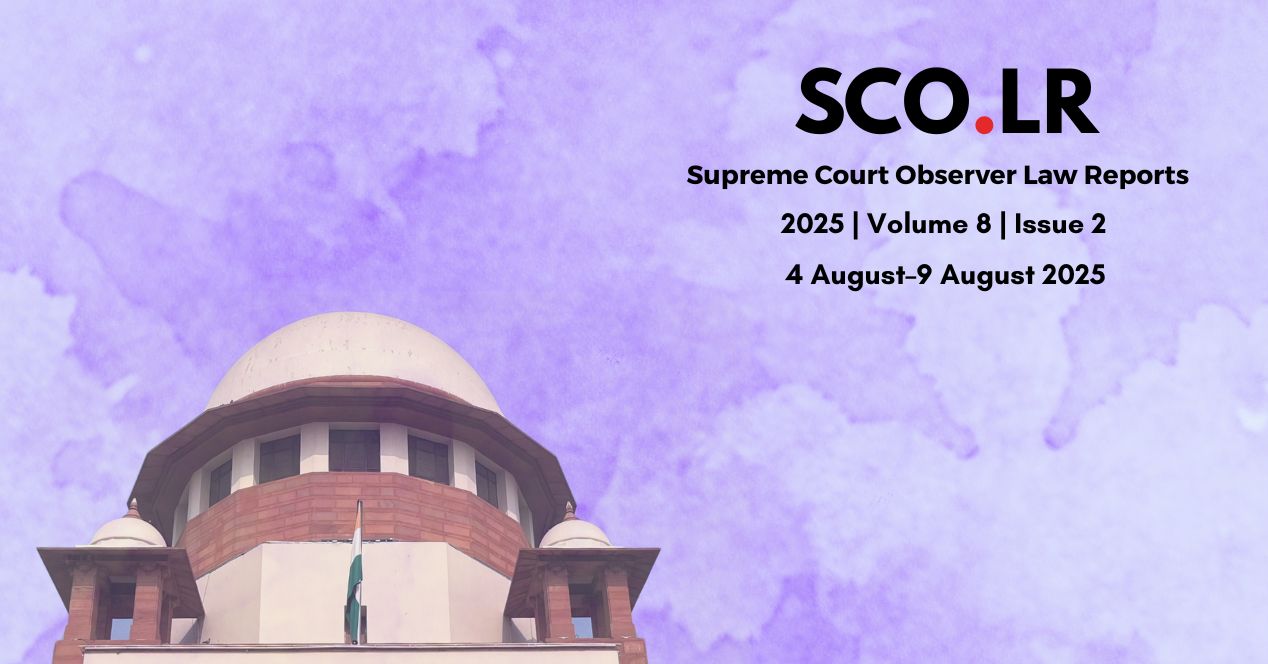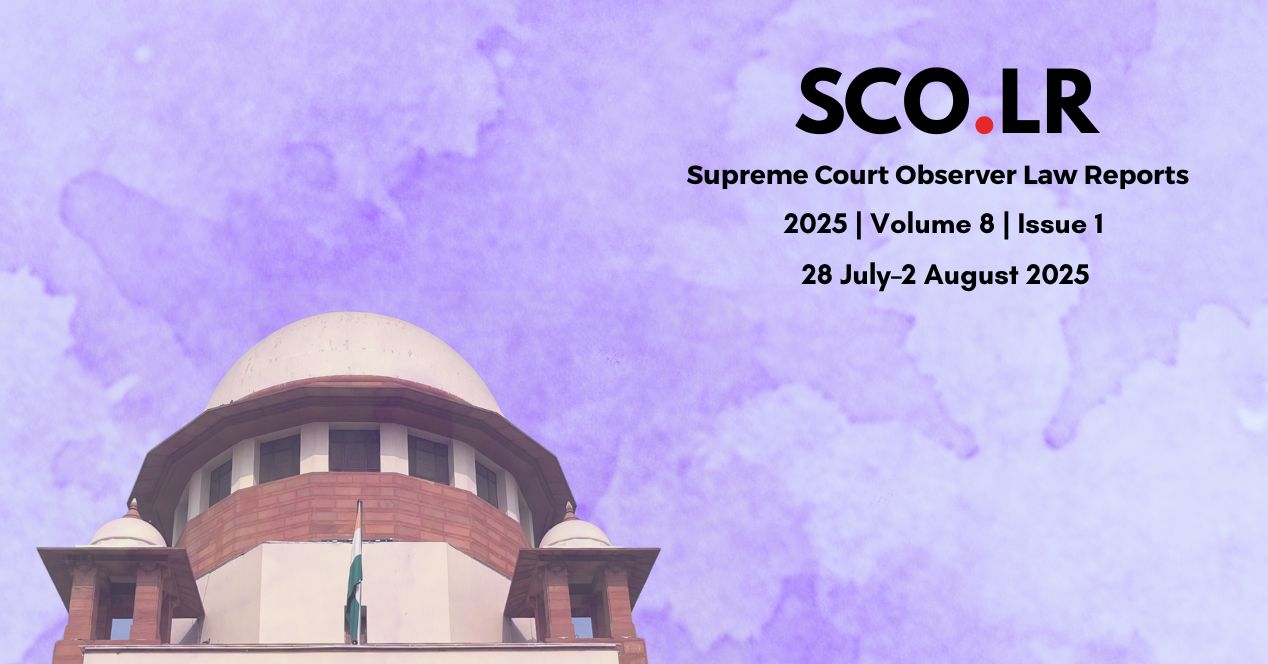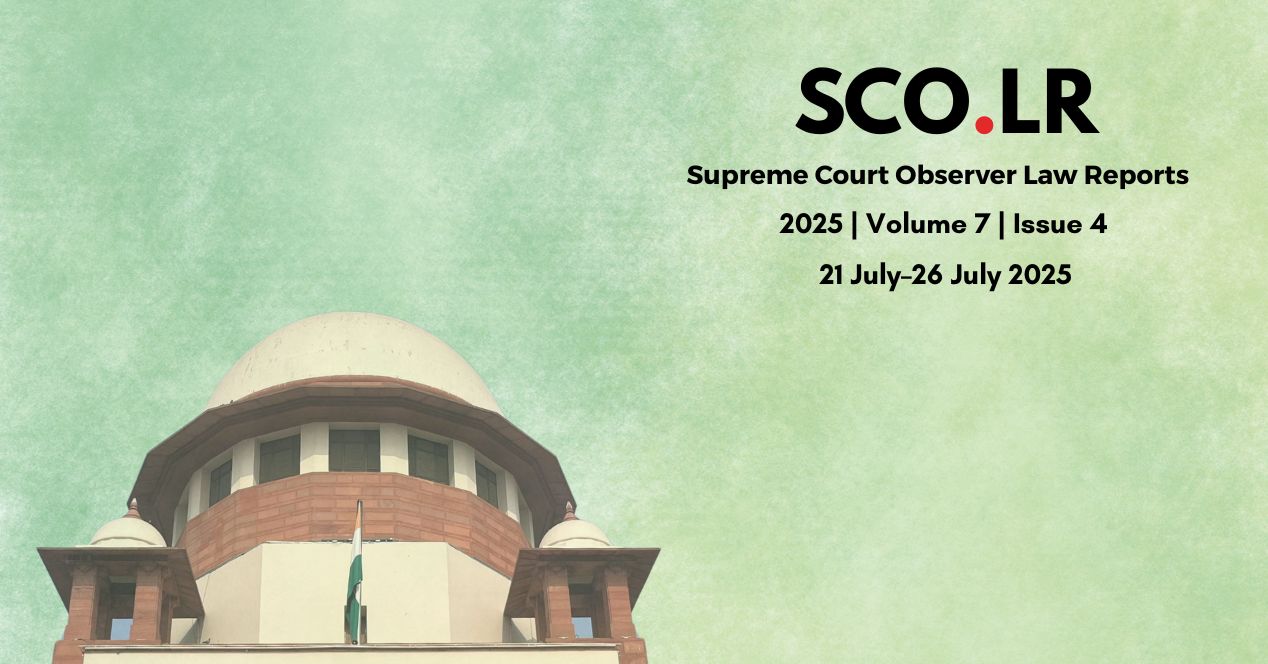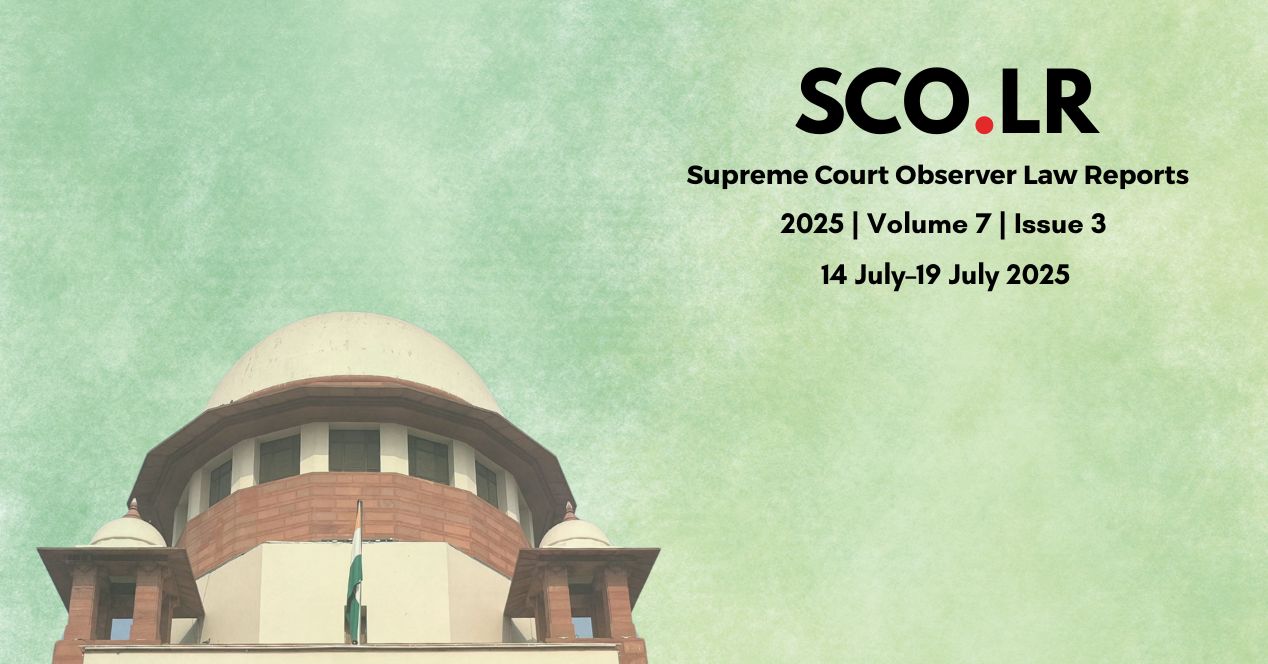Analysis
SCO.LR | 2025 | Volume 8 | Issue 3
In this Issue of SCO.LR, we bring you five important judgements from 11 August to 16 August 2025
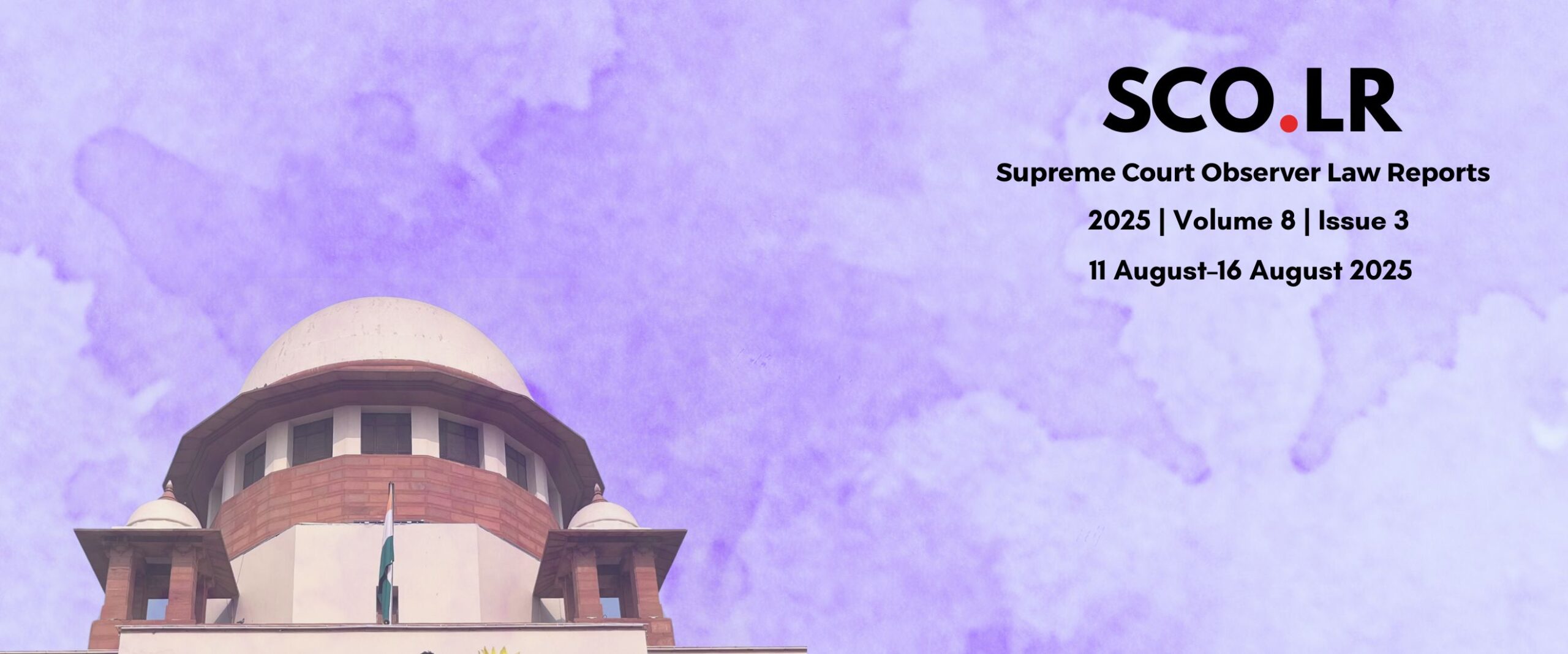
Volume 8 Issue 3 of the Supreme Court Observer Law Reports (SCO.LR) is here! In this Issue, we have shortlisted five key judgements that deal with the value of pre-Independence documents in verifying caste claims, the factors to be considered in adoption cases, trademark law and parallel investigations under the Central and State Goods and Service Tax regime. Scroll ahead to read now.
Find them in HTML format on our dedicated SCO.LR page!
**********
The Supreme Court Observer Law Reports
SCO.LR | Volume 8 | Issue 3
11 August–16 August 2025
**********
Value of Pre-Independence Documents in Verifying Caste Claims
Yogesh Madhav Makalwad v State of Maharashtra
12 August 2025
Citations: 2025 INSC 964 | 2025 SCO.LR 8(3)[11]
Bench: Chief Justice B.R. Gavai, Justices S.C. Sharma and K.V.Chandran
The Supreme Court held that pre-Independence documents have higher probative value in caste claim verification and that the affinity test cannot be applied as a litmus test to reject such claims.
Yogesh Madhav Makalwad’s caste certificate as “Koli Mahadev” Scheduled Tribe was invalidated by the Scheduled Tribe Certificate Scrutiny Committee, Aurangabad Division, Aurangabad. The Bombay High Court upheld the decision of the Scrutiny Committee. The High Court rejected school admission records of Makalward’s father from 1943 and other family records as unreliable. They relied on Makalwad’s inability to clear the affinity test instead.
The Supreme Court set aside the Bombay High Court’s judgment. It found the 1943 school admission record as genuine. The Court relied on Anand v Committee for Scrutiny & Verification of Tribe Claims (2011), and reiterated that the affinity test is not an essential part in the process of determining the correctness of a caste or tribe claim in every case.
Keywords/phrases: Schedule Tribe Certificate—pre-Independence documents—higher probative value—affinity test not conclusive—Bombay High Court Judgement set aside
Read the Judgement here.
**********
Convict Entitled to Immediate Release After Completion of Life Sentence
Sukhdev Yadav @ Pehalwan v State (NCT of Delhi)
12 August 2025
Citations: 2025 INSC 969 | 2025 SCO.LR 8(3)[12]
Bench: Justices B.V. Nagarathna and K.V. Viswanathan
The Supreme Court held that a convict sentenced to life imprisonment for a fixed term is entitled to immediate release upon completing the term, without having to apply for remission. Detention beyond this period violates Article 21 of the Constitution.
Sukhdev Yadav was serving a sentence of life imprisonment for 20 years without the scope of remission. In November 2024, the Delhi High Court dismissed his petition seeking furlough, i.e. release for a short term. He appealed to the Supreme Court. In March 2025, he completed 20 years of his sentence, while his petition remained pending. The Supreme Court permitted him to seek immediate release based on the completion of his sentence. The State of Delhi argued that Yadav had to seek remission.
The Supreme Court held that the bar on remission was applicable while he was serving his sentence. After its completion, he was not required to seek remission. The Court directed all prisons to release prisoners whose jail terms were complete. The Registry was directed to circulate a copy of the Order to all the Home Secretaries of the States or Union Territories.
Keywords/phrases: Section 432 read with 433A of the Code of Criminal Procedure, 1973—remission—life imprisonment without remission—immediate release after completion of sentence—no remission application after completion of sentence
Read the Judgement here.
**********
Custody of Children to be Returned to “Adoptive Parents” in Best Interest of the Child
Dasari Anil Kumar v The Child Welfare Project Director
12 August 2025
Citations: 2025 INSC 972 | 2025 SCO.LR 8(3)[13]
Bench: Justices B.V. Nagaratha and K.V. Viswanathan
The Supreme Court used its plenary powers under Article 142 to vest custody of minor children to their “adoptive parents”, even when the legality of adoption is in question. considering the existing bonding between the “adoptive parents” and the children.
On 22 May 2024, the police had taken custody of minor children from several adoptive parents based on an FIR that the adoptions were unlawful. The parents moved the Telangana High Court. A Single-Judge Bench ruled in favour of the adoptive parents having custody. A Division Bench reversed the Order, directing that the children remain in the custody of the Child Welfare Committee while proper adoption procedures were followed.
The Supreme Court set aside the Division Bench’s Order under Article 142, relying on the “best interest of the child” principle. They considered the existing bond between adoptive parents and the child. The Bench further imposed safeguards by directing the State Legal Services Authority or District Legal Services Committee to obtain quarterly reports on the children’s welfare and progress, and allowing them to depute a Child Welfare Expert for home inspections.
Keywords/phrases: Hindu Adoption and Maintenance Act 1965—Juvenile Justice Act 2015—minor children in custody of adoptive parents during the adoption process—Division Bench of Telangana High Court gives custody to State—Supreme Court directed return to adopted parents using Article 142, considering the best interest of the child
Read the Judgement here
**********
Criteria for Interim Injunction in Trademark Cases
Pernod Ricard India Private Limited v Karanveer Singh Chhabra
14 August 2025
Citations: 2025 INSC 981 | 2025 SCO.LR 8(3)[14]
Bench: Justices J.B. Pardiwala and R. Mahadevan
The Supreme Court held that rival marks in a trademark dispute must be assessed in their entirety rather than dissecting composite trademarks into isolated components.
The appellant, Pernod Ricard India Pvt. Ltd. had sought a permanent injunction restraining the respondent, Karanveer Chhabra, on the ground that his brand “London Pride” infringed the trademark of their label, “Blenders Pride” and “Imperial Blue”. The Indore Commercial Court and the Madhya Pradesh High Court refused to grant an interim injunction. The appellant approached the Supreme Court.
The Supreme Court upheld the decisions of the Commercial Court and the High Court. It held that the applicable standard is that of an average consumer with imperfect recollection. No deceptive similarity was found between the marks.
Keywords/phrases: Trade Marks Act, 1999 – infringement – registration – deceptively similar – passing off – likelihood of confusion.
Read the Judgement here.
**********
Subject Matter and Statutory Bar in CGST Proceedings
M/S Armour Security (India) Pvt Ltd v Commissioner, CGST
14 August 2025
Citations: 2025 INSC 982 | 2025 SCO.LR 8(3)[15]
Bench: Justices J.B. Pardiwala and R. Mahadeven
The Supreme Court held that the issuance of a summons under Section 70 of the Central Goods and Services Tax Act, 2017, does not amount to the formal initiation of proceedings under the Act.
M/S Armour Security received a show cause notice under Section 73 of CGST. Subsequently, CGST conducted a search and issued two separate summons to directors of the company. The petitioner approached the Delhi High Court challenging the two summons, arguing that the SGST investigated same “subject matter”. The petitioner argued that under Section 6(2)(b) of the CGST Act, one authority is barred from initiating proceedings if the “subject matter” of that proceeding is already being handled by the other authority. The High Court dismissed the petition and held that the summons is merely a precursor to gather information.
The Court upheld the High Court Order. The Court laid down a two-fold test to determine if the subject matter is the same: whether the authority has already acted on an identical tax liability on similar facts and whether the relief sought is identical. It held that overlapping aspects of inquiries do not make “subject matter” identical unless a show cause notice specifies the liability.
Keywords/phrases: Section 70 of the Central Goods and Services Tax Act, 2017—summons—Section 6(2)(b) of the CGST Act—subject matter of proceedings—overlapping inquiries—initiation of proceedings
Read the Judgement here.

